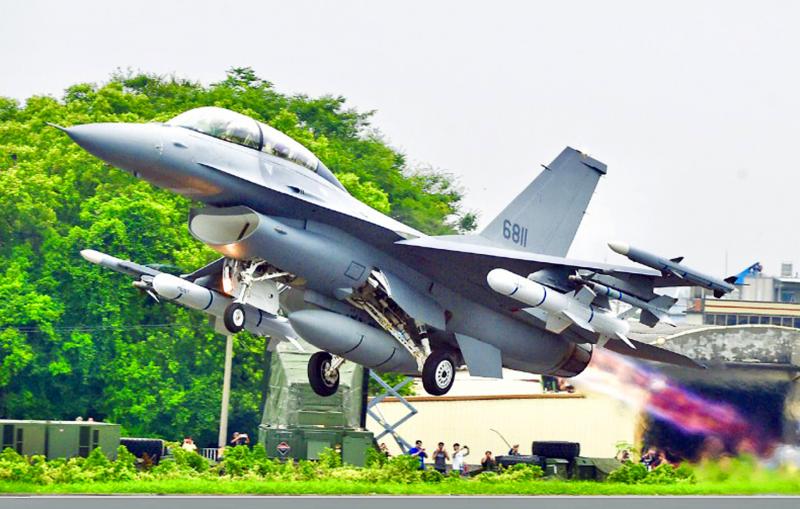The Han Kuang exercises, the nation’s major war games, are to start today and run for five days.
The drills are to include a military aircraft emergency takeoff and landing exercise on a regular roadway on Wednesday, featuring all three fighter jet models in Taiwan’s fleet, a military source said last week.
The drill is to begin at 6:30am on a 3km section of Provincial Highway No. 1 in Pingtung County’s Jiadong Township (佳冬), and feature an Indigenous Defense Fighter, an F-16V, a Mirage 2000-5 and an E-2K Hawkeye early warning aircraft, the source said.

Photo: Peter Lo, Taipei Times
The emergency landing and takeoff drill aims to test each aircraft’s ability to land on the roadway in case the airstrip at the nearby Pingtung Air Base is seriously damaged by enemy forces, the source said.
It would be the first time that such a drill is held on a smaller roadway featuring stoplights and intersections.
Previously, emergency landing exercises have been held on sections of the Sun Yat-sen Freeway (Freeway No. 1) in Tainan’s Madou (麻豆) and Rende (仁德) districts, as well as Changhua County’s Huatan Township (花壇) and Chiayi County’s Minsyong Township (民雄).
The Han Kuang exercises have been held annually since 1984, including live-fire drills and computerized war games, to test Taiwan’s combat readiness in the event of a Chinese invasion.
Tabletop drills for this year’s exercises were held from April 23 to 30.

Nipah virus infection is to be officially listed as a category 5 notifiable infectious disease in Taiwan in March, while clinical treatment guidelines are being formulated, the Centers for Disease Control (CDC) said yesterday. With Nipah infections being reported in other countries and considering its relatively high fatality rate, the centers on Jan. 16 announced that it would be listed as a notifiable infectious disease to bolster the nation’s systematic early warning system and increase public awareness, the CDC said. Bangladesh reported four fatal cases last year in separate districts, with three linked to raw date palm sap consumption, CDC Epidemic Intelligence

The manufacture of the remaining 28 M1A2T Abrams tanks Taiwan purchased from the US has recently been completed, and they are expected to be delivered within the next one to two months, a source said yesterday. The Ministry of National Defense is arranging cargo ships to transport the tanks to Taiwan as soon as possible, said the source, who is familiar with the matter. The estimated arrival time ranges from late this month to early next month, the source said. The 28 Abrams tanks make up the third and final batch of a total of 108 tanks, valued at about NT$40.5 billion

Two Taiwanese prosecutors were questioned by Chinese security personnel at their hotel during a trip to China’s Henan Province this month, the Mainland Affairs Council (MAC) said yesterday. The officers had personal information on the prosecutors, including “when they were assigned to their posts, their work locations and job titles,” MAC Deputy Minister and spokesman Liang Wen-chieh (梁文傑) said. On top of asking about their agencies and positions, the officers also questioned the prosecutors about the Cross-Strait Joint Crime-Fighting and Judicial Mutual Assistance Agreement, a pact that serves as the framework for Taiwan-China cooperation on combating crime and providing judicial assistance, Liang

A group from the Taiwanese Designers in Australia association yesterday represented Taiwan at the Midsumma Pride March in Melbourne. The march, held in the St. Kilda suburb, is the city’s largest LGBTQIA+ parade and the flagship event of the annual Midsumma Festival. It attracted more than 45,000 spectators who supported the 400 groups and 10,000 marchers that participated this year, the association said. Taiwanese Designers said they organized a team to march for Taiwan this year, joining politicians, government agencies, professionals and community organizations in showing support for LGBTQIA+ people and diverse communities. As the first country in Asia to legalize same-sex